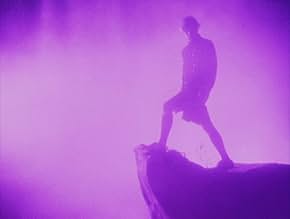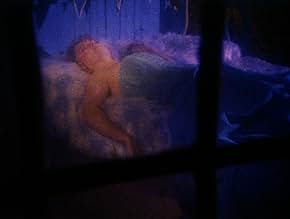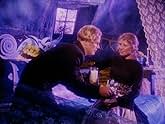The wary residents of a 19th century mountain village must tread carefully and speak softly lest they cause an avalanche. Sexual frenzies teem in this world of repression, setting off incest... Read allThe wary residents of a 19th century mountain village must tread carefully and speak softly lest they cause an avalanche. Sexual frenzies teem in this world of repression, setting off incestuous love triangles with deadly consequences.The wary residents of a 19th century mountain village must tread carefully and speak softly lest they cause an avalanche. Sexual frenzies teem in this world of repression, setting off incestuous love triangles with deadly consequences.
- Awards
- 1 win total
Andrea Von Wichert
- Townsperson
- (as Andrea Wichert)
Featured reviews
Guy Madden is almost like the David Lynch of Canada. His films have a look all of their own; blending surrealism with German style expressionism. The grainy slightly faded style of his films, make them appear from another era. "Careful" is filmed in a bright Technicolor style that's visually dazzling. The film contains Icelandic folk lore with dark humor. The story concerns a town living in the mountains. They have to watch their every move so they don't cause an avalanche. So they try to keep quiet and not make much noise out of fear. Many of the characters have strange incestuous desires that lead them to insanity. Especially Yohan and his fantasies about his mother. Yuck! This is one strange film, with picturesque landscapes that look like they jumped out of a Salvador Dali painting. If you are looking for a disturbing candy colored dark comedy, careful you don't pass this opportunity up.
This is the second Guy Maddin film that I've seen (the other being "Twilight of the Ice Nymphs") and in both cases, the films wore out their welcome about half an hour in.
I enjoy the offbeat style of the humor, the intentional visual stylization patterned after early silent films (this one reminded me particularly of the work of Melies), and I have no problem with the flat acting style (which is an honest homage to early film acting) or the coloring (which, again, is based in films of yesteryear). Where Maddin's films run into trouble is, as soon as the novelty has worn off and the character based introductory jokes have played out, there is simply nothing beneath it all for the film to fall back on.
The story is actually very simple, yet it is so relentlessly bizarre that it borders on surrealism. So, either there is no deeper meaning to the story, or it's so far buried that it eludes me during the actual viewing of the piece. (Not that one can't come up with various things after the fact; I simply doubt that the director intended them or had any control over them if I can only interpret the vaguest elements of the story.)
The concept of Oedipal lust and such simply aren't enough to sustain a film of this length. Not in the way that they are handled anyway. The film is absolutely brilliant up until Johann dies. It then withers quickly, as the last real belly laugh comes in the first few minutes of "Part Two." The remaining hour or so limps along to a decent though unsatisfying end.
Guy Maddin is without doubt a clever and unique director, and I look forward to the day when I can say that I've seen him at his best. But he's far from it in this film in my opinion.
Endless homages to early films aren't enough to last 100 minutes... And perversity caused by child rearing needs to be handled more cleverly to take up the slack...
I enjoy the offbeat style of the humor, the intentional visual stylization patterned after early silent films (this one reminded me particularly of the work of Melies), and I have no problem with the flat acting style (which is an honest homage to early film acting) or the coloring (which, again, is based in films of yesteryear). Where Maddin's films run into trouble is, as soon as the novelty has worn off and the character based introductory jokes have played out, there is simply nothing beneath it all for the film to fall back on.
The story is actually very simple, yet it is so relentlessly bizarre that it borders on surrealism. So, either there is no deeper meaning to the story, or it's so far buried that it eludes me during the actual viewing of the piece. (Not that one can't come up with various things after the fact; I simply doubt that the director intended them or had any control over them if I can only interpret the vaguest elements of the story.)
The concept of Oedipal lust and such simply aren't enough to sustain a film of this length. Not in the way that they are handled anyway. The film is absolutely brilliant up until Johann dies. It then withers quickly, as the last real belly laugh comes in the first few minutes of "Part Two." The remaining hour or so limps along to a decent though unsatisfying end.
Guy Maddin is without doubt a clever and unique director, and I look forward to the day when I can say that I've seen him at his best. But he's far from it in this film in my opinion.
Endless homages to early films aren't enough to last 100 minutes... And perversity caused by child rearing needs to be handled more cleverly to take up the slack...
I love Guy Maddin's work and this is my favourite of his films. It's odd and unsettling and it sticks with you long after you've watched it.
It's definitely not the most accessible of his works, but I like it. It's been described as a "pro-repressionist" movie, but I don't think that's entirely accurate.
The people portrayed in the village are deeply repressed and one small push makes their whole stack of cards morals come tumbling down. It's tale of three brothers and their trials and tribulations.
Their father is deceased and one brother, Vince Rimmer as Franz, is an invalid confined to the attic, who can do little more than watch as his brothers are tempted and run amok.
First Brent Neale as Johann, then Kyle McColloch as Grigorss give in to their desires and forbidden longings with tragic consequences. Kyle McColloch is a Maddin regular and he shines here.
Engagements are broken, people have knife fights and their mother is seeking to re-marry.
It's definitely not the most accessible of his works, but I like it. It's been described as a "pro-repressionist" movie, but I don't think that's entirely accurate.
The people portrayed in the village are deeply repressed and one small push makes their whole stack of cards morals come tumbling down. It's tale of three brothers and their trials and tribulations.
Their father is deceased and one brother, Vince Rimmer as Franz, is an invalid confined to the attic, who can do little more than watch as his brothers are tempted and run amok.
First Brent Neale as Johann, then Kyle McColloch as Grigorss give in to their desires and forbidden longings with tragic consequences. Kyle McColloch is a Maddin regular and he shines here.
Engagements are broken, people have knife fights and their mother is seeking to re-marry.
I really like Maddin. I like the way he thinks visually first. Narrative is not only woven into and communicated by cinematic means, but his characters live in a similar world. They experience the world, the same way we experience the film: by what some call a surrealistic dream world. It is not. Rather it is a world wholly driven by laws, laws we understand because they are rooted in film worlds we have visited.
I have two of his films on my "must experience before you die" list. This one is narratively less subtle and powerful than those. He makes a trade-off by investing in what is often - including here - called "German Expressionism." Actually, the model is German mountain films, a quite different beast: one that is more genuinely pre-noir.
The world behind those films has a people in tune with a nature that limits their lives, often controlling. American noir would later merge this collection of laws with the narrative conventions built into the act of viewing. What this film does is insert itself before that development. It is pre-noir tragedy with noir-like conventions, cast using those German pre- noir images.
It is a stretch to merge German notions of superior harmony with the mountain homeland with the Nazi comfort with the cruelty of nature. But heck, others do; there is the tradition of Riefenstahl's mountain films and then her similarly inspired Nazi propaganda; and after all, films like this encourage such stretches. And a similar stretch goes in the "White Ribbon" direction, with nature and its German bond with sexual repression behind what happened. Herzog continues this even today.But all that is predicable and easy to read, compared to Maddin's deeper stuff.
Ted's Evaluation -- 3 of 3: Worth watching.
I have two of his films on my "must experience before you die" list. This one is narratively less subtle and powerful than those. He makes a trade-off by investing in what is often - including here - called "German Expressionism." Actually, the model is German mountain films, a quite different beast: one that is more genuinely pre-noir.
The world behind those films has a people in tune with a nature that limits their lives, often controlling. American noir would later merge this collection of laws with the narrative conventions built into the act of viewing. What this film does is insert itself before that development. It is pre-noir tragedy with noir-like conventions, cast using those German pre- noir images.
It is a stretch to merge German notions of superior harmony with the mountain homeland with the Nazi comfort with the cruelty of nature. But heck, others do; there is the tradition of Riefenstahl's mountain films and then her similarly inspired Nazi propaganda; and after all, films like this encourage such stretches. And a similar stretch goes in the "White Ribbon" direction, with nature and its German bond with sexual repression behind what happened. Herzog continues this even today.But all that is predicable and easy to read, compared to Maddin's deeper stuff.
Ted's Evaluation -- 3 of 3: Worth watching.
Hilariously demented: Take camera work and set design inspired by "The Cabinet Of Dr. Caligari" and the early talkie "Svengali", scenario and dialogue that might have been written by Ibsen (under the influence of peyote), then put a creature from Alpha Centauri doing his first English-language film in the director's chair and you get some idea of what this movie is like.
If there's not something wrong with you, you won't like this movie at all, but there's much here that twisted sensibilities will find appealing. Consider yourself warned.
If there's not something wrong with you, you won't like this movie at all, but there's much here that twisted sensibilities will find appealing. Consider yourself warned.
Did you know
- TriviaRebecca Gibson's debut.
- ConnectionsFeatured in Guy Maddin: En attendant le crépuscule (1997)
- How long is Careful?Powered by Alexa
Details
Contribute to this page
Suggest an edit or add missing content





























